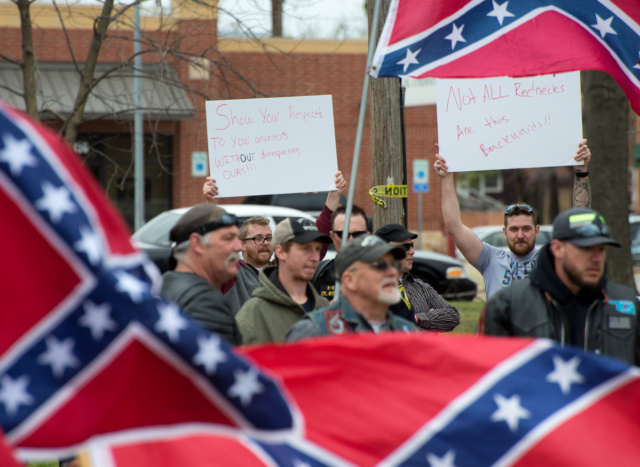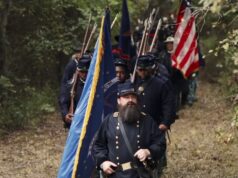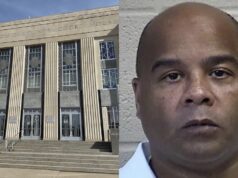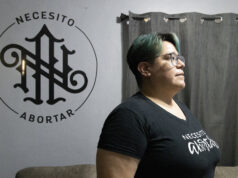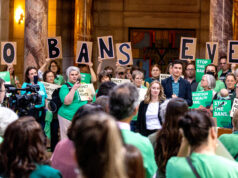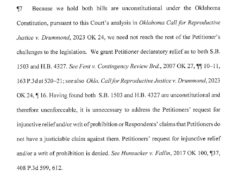
SHAWNEE, Oklahoma — I have more than a half-dozen direct ancestors who lived in Tennessee, Arkansas, Georgia, Louisiana and Mississippi and fought for the South. As I listened to speeches during a Confederate flag rally Saturday in Shawnee, I wondered if my claim to being a Son of the Confederacy might be far greater than any of the members present that day.
Nevertheless, I had come because I wondered why, in the year 2017, was a “Rally for the Confederate Flag” being held in a small central-Oklahoma town?
Oklahoma wasn’t even a state in the 1860s. There hasn’t been some hue and cry to save the Confederate flag here. It hasn’t been a public issue of note, unless the Confederate battle flag was somehow appended to that Ten Commandments monument bill when I wasn’t looking.
Put simply, the Confederate flag has not been a political issue the same way it has been across true Southern states.
Still, as I walked from my car down into Woodland Veterans Park, I saw about 100 people in attendance and a dozen or more large Confederate flags blowing in the breeze. Several smaller flags came into view as I got closer.
These people seemed to know why they were here.
‘Deo Vindice’
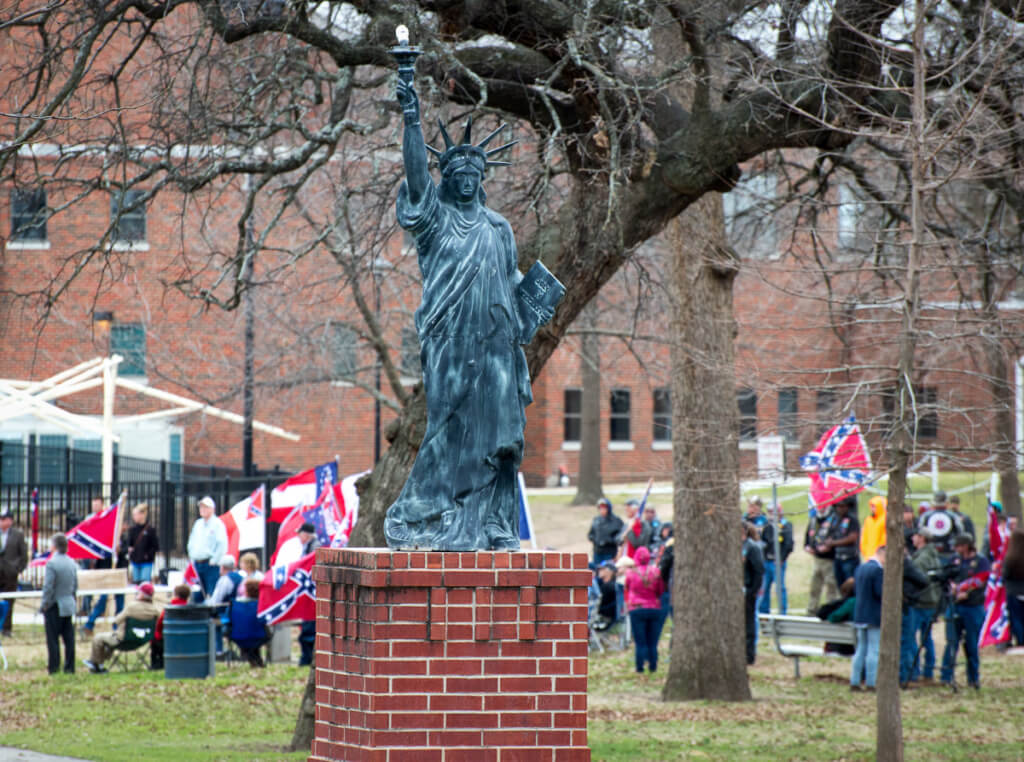
At the edge of the park, about a dozen black-uniformed policemen gathered around their supervising officer, no doubt planning their strategy in case something went wrong. Other officers I recognized as Pottawatomie County sheriff’s deputies posted up at other corners of the park but well back from the crowd.
A nearly equal number of patch- and leather-clad bikers — members of the Sons of Confederate Veterans Mechanized Cavalry — stood at the back of the gathered crowd, which faced a podium and portable sound system. Only the bandannas outnumbered the beards. Emblazoned on some of their leather jackets were the words, Deo Vindice — a Latin phrase meaning, “With God as our protector.” It was the official motto of the Confederate States of America during the Civil War.
Nearer to the podium were more elderly couples sitting in lawn chairs. To the side, at attention, stood a color guard dressed in Civil War gray and armed with bayoneted Enfield muskets of the time. I think I recognized some of them from the last Civil War battle re-enactment I attended at Yale.
‘We are here to vindicate our ancestors’
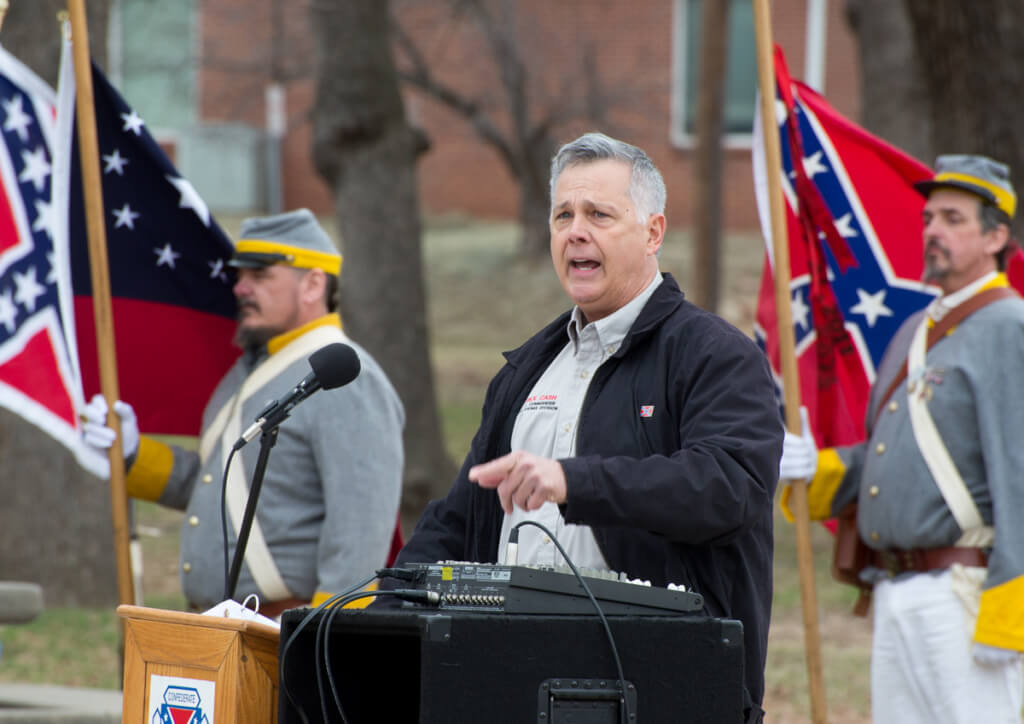
Rex Cash, the Lt. Commander of the Sons of Confederate Veterans Oklahoma Division, hosted the rally. He summed up his rally’s goal rather simply: vindicating Civil War-era ancestors who fought for the South. He said the Confederate battle flag was not a political statement — it was a battle flag that represented those who served under it. The audience then learned of Cash’s family genealogy, which included several ancestors who fought for the Confederacy.
“It is personal to me,” Cash said. “We are here to vindicate our ancestors, who fought with honor and courage.”
In his view, the flag was another image of his family ancestors, and he said that is what opponents of the Confederate flag don’t get.
Cash took great pains to refute any notion that either he or his organization endorsed any racism or hatred. Cash said his organization was offended by racist groups “hijacking” the Confederate battle flag.
“I don’t like being called a racist or white supremacist. And neither do you!” Cash shouted to the crowd. That drew but a mild applause, which made me wonder if perhaps a few in his midst might render such labels appropriate.
Cash made the argument that the Ku Klux Klan had not taken on the Confederate battle flag as their symbol until the 1950s, long after the majority of lynchings had taken place. So, don’t blame the flag, he said. He criticized Oklahoma Baptist University for recently removing the Confederate flag from a display on its Shawnee campus.
“This is what happens when there is boring predictability,” Cash said. “Principle and fact are sacrificed for the idol of political correctness.”
History often debated
I was puzzled by the need to defend one’s ancestors who fought for the South in the Civil War — as if our ancestors’ participation somehow taints our existence today — unless we can establish that the soldiers’ conduct 150 years ago was honorable.
Cash correctly pointed out that it was not a Confederate Supreme Court that ruled in 1857 that blacks were not citizens nor which later upheld Jim Crow laws. It was the U.S. Supreme Court that did that under the U.S. flag. Of course, the Confederate Supreme Court did not last long enough to entertain such issues.
Regardless, I wasn’t sure if I was supposed to understand his point that one should not “punish” a flag for misdeeds, or whether I should believe that, had Abraham Lincoln left the South alone, the Confederate States of America would have evolved into a shining example of human rights and enlightenment, surpassing any corrupt government offered by the United States of America.
Cash’s speech eventually turned on Lincoln as some diabolical oppressor who planned all along to “invade another country.” (I suppose Cash believes secession was legal, and the South was another country.) There was no mention of Fort Sumter, where Confederate artillery fired the first shots against a Union garrison to start the war.
Cash said the Civil War wasn’t about slavery at all. He said it was about government overreach and the North taking advantage of the South. He said to look at Lincoln’s inaugural speech of 1861. So, I did. It turns out Lincoln spent much time talking about slavery in that speech and whether the states could decide the issue themselves. He specifically promised not to invade the South.
(Well, he said there would be no “lawless” invasion, anyway.)
‘I take it personal’
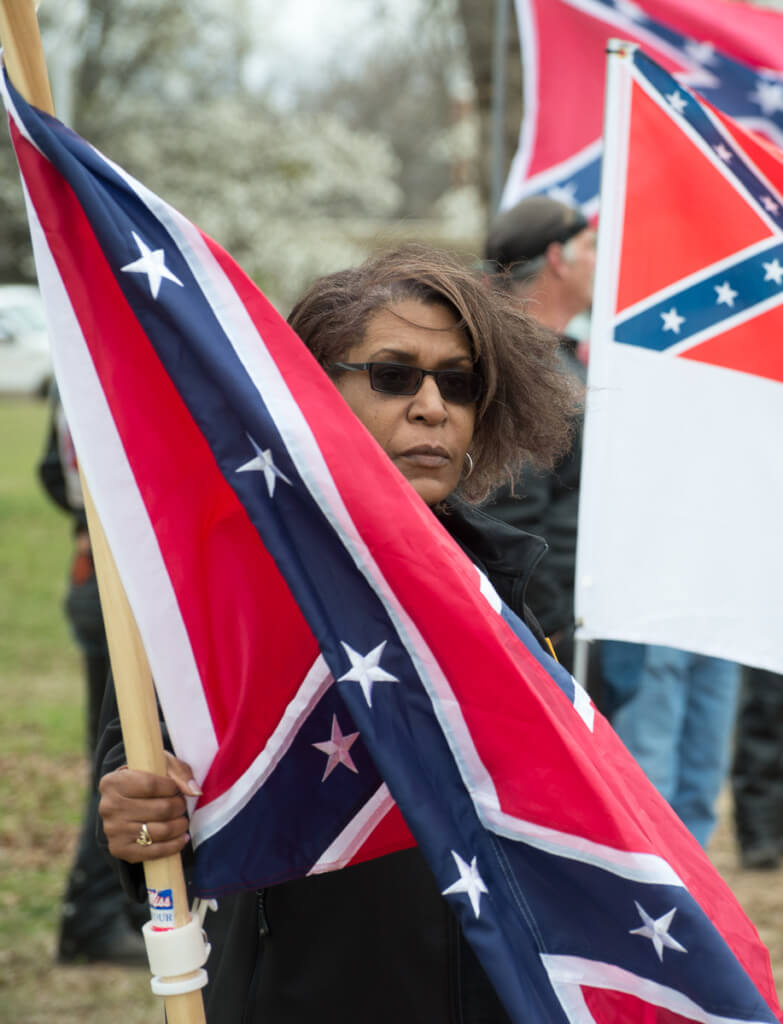
One of the speakers in the park was Arlene Barnum, a black woman from Oklahoma who has traveled the South to campaign against removing Confederate flags and monuments. She said the Confederacy was part of her family history in Louisiana, and removing the flag was disrespectful to her family.
“Had the Union not invaded the South, my great-great grandmother (a slave) would not have died by Union soldiers,” Barnum said. “She would have been alive to raise her 2-year-old child. I take it personal.”
Barnum’s appearance raised more than a few eyebrows in the crowd. As she finished her speech, one white woman gave her a hug and called her “sister.” Certainly, having a black person support the Confederate flag is an effective method to demonstrate that supporters are not racists and white supremacists.
Counter-demonstration arrives
Not everyone was so supportive.
Halfway through the rally, a half-dozen young white men quietly approached the back of the crowd with signs of protest. One sign read, “Not all rednecks are this backwards!!”
A few young black men who had lingered at the park’s edge also came closer to the crowd and listened.
Meanwhile, a wiry 20-something man held a sign about 50 yards away. His sign depicted the Confederate battle flag as being equal to “treason,” and he began yelling, which caused one of the speakers at the podium to lose his train of thought momentarily.
An older gray-haired woman began walking to the rear of the park to confront the mouthy protester. Police followed. When she came upon him, she firmly but calmly explained to him how it was rude to interrupt. The young man, who said his name was Christopher, lowered his voice and told her his protest was against racism. Their back-and-forth continued out of earshot of the rally but with Shawnee police keeping close eye on it.
Another speaker echoed Cash and Barnum about how the flag is not about racism.
“It’s in honor of our family,” said Kevin Easterling, a Sons of Confederate Veterans officer from Moore.
Then, with a rousing a cappella rendition of “Dixie” followed by some gun salutes from the honor guard, the rally came to a close.
And that is when things got more interesting.
A heated back and forth
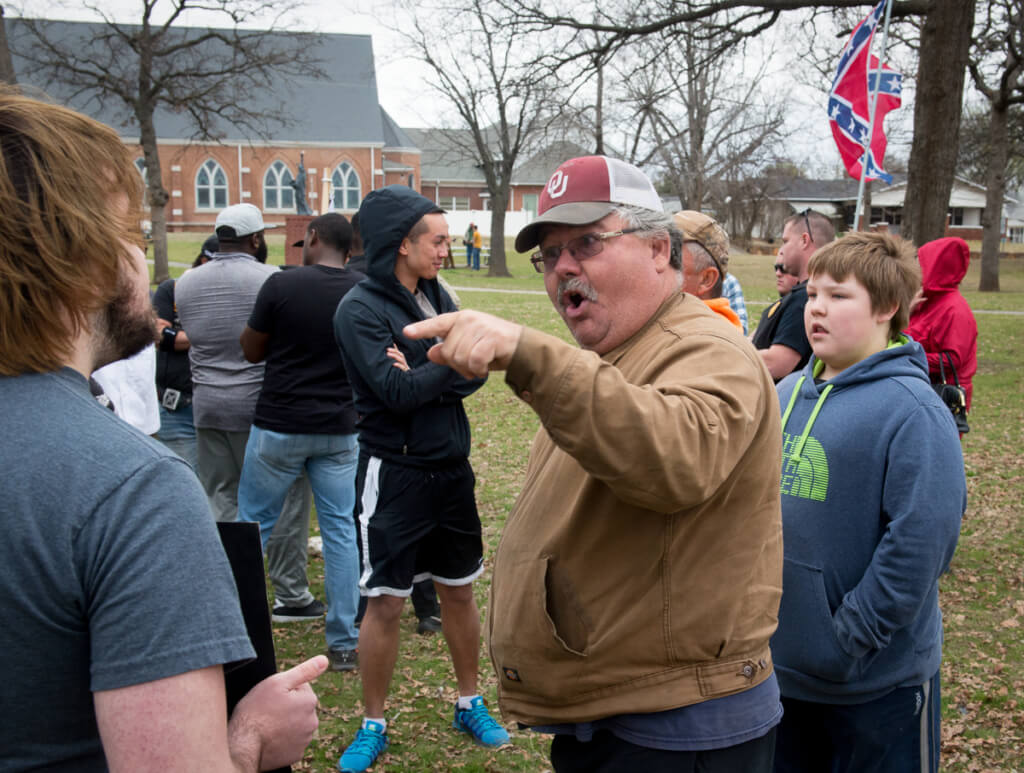
A series of verbal skirmishes began between young white protesters and some of the rally attendees. Nothing physically violent. Just strong words. Forceful expressions. That continued for a good 45 minutes after the rally ended — out there beneath the park’s walnut and oak trees. Police officers stood by in close attention like referees at a basketball game, but they never had to call a foul.
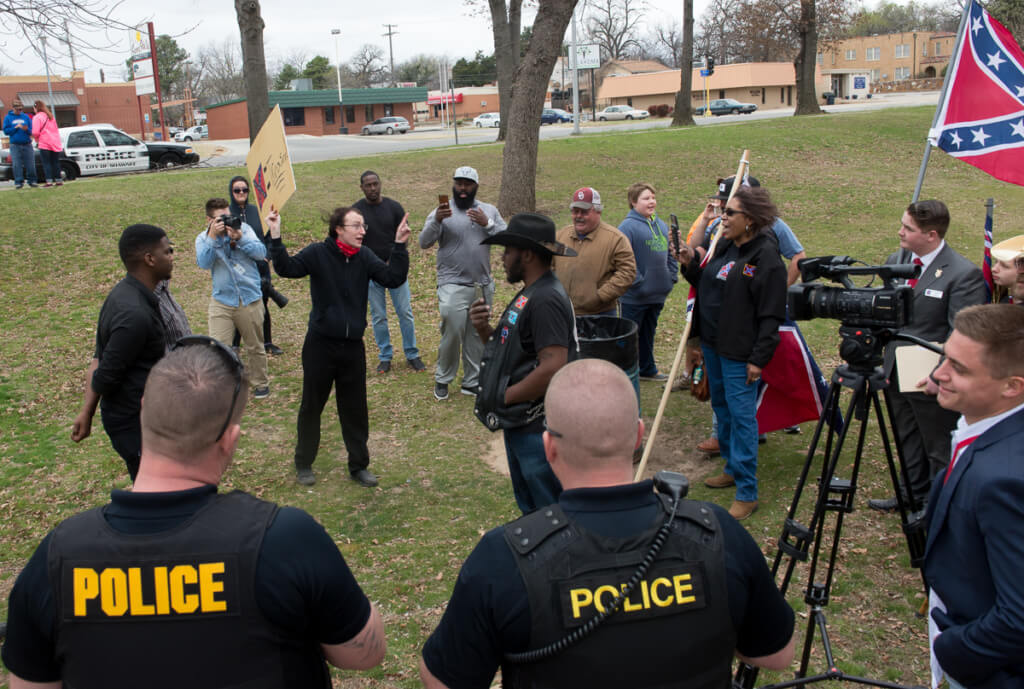
Barnum hurried over to confront the young man, Christopher, whose half-hour of yelling had nearly made him hoarse. The fact a black woman was arguing for the Confederate flag while a white man was arguing against it, created, for me, a moment of disorientation.
That debate ran off the rails when it boiled down to an argument over whether Abraham Lincoln had ever held slaves. With the discussion turning circular, I decided to head home.
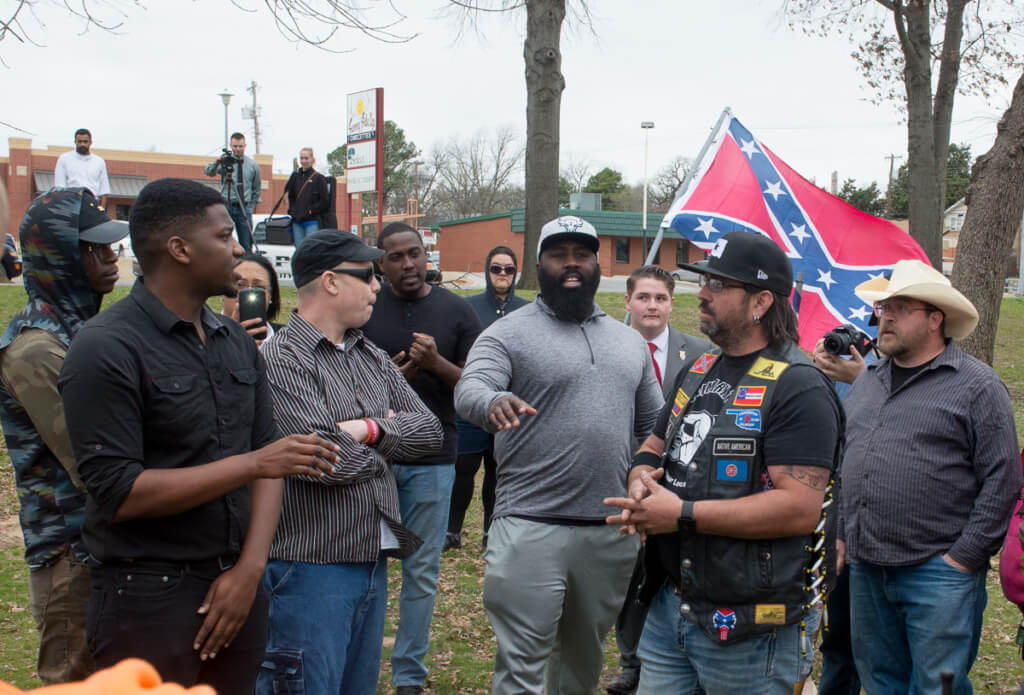
Sons of Confederate Veterans seek imaginary sanctity
The Sons of Confederate Veterans and folks like them are fighting a battle to resurrect some sanctity of the Confederate battle flag that never existed. Even if it did, it’s long gone. Like it or not — fair or not — even Cash admitted the KKK hijacked the symbol, and white supremacists aren’t giving it back. Say what you want about the honor and courage of your forefathers, the 20th- and 21st-century meaning of this flag has little to do with that and more to do with lingering racism in this country.
To argue that the ancestors had a noble cause necessarily turns the debate into an argument attempting to justify the Confederacy in the first place. And that does not fly.
What Confederate flag supporters refuse to acknowledge is that, had the Union failed and the Confederacy survived, slavery and oppression of the black race in America would have continued into the 20th century. There was no move afoot to bring equality to the races in the South. Per the Deo Vindice motto, the whites believed they had moral and religious justification for their presumed racial superiority.
These Sons of Confederate Veterans who are hung up on vindicating their ancestors and protecting the honor of the Confederate flag ignore that.
Keep family history separate from self-worth
The oldest piece of memorabilia in my family is the charcoal portrait of Samuel F. Darnall that hangs in my living room. It was drawn by an unknown artist in the late 1870s in north Texas, where he had moved from Tennessee after his service in Newsom’s Regiment of the Tennessee Cavalry in 1863. He served in the Army of Tennessee, along with his brother, James, who died at the Battle of Chickamauga.
Their cavalry commander was none other than Nathan Bedford Forrest, later said by historians to be one of the early Grand Wizards of the Ku Klux Klan.
Still, I have never felt the need to “vindicate” my ancestors. I assume (I think rightly) our Southern ancestors had little choice but to fight for the Confederacy like most of their neighbors.
Their choice was either to avoid enlistment and face ridicule for cowardice and treason to the Homeland or join up and risk death. The former was a certainty. The latter was merely a theoretical possibility. Still, there weren’t many conscientious objectors back in the 1860s on either side.
So, I don’t blame my great-great grandfathers for enlisting and fighting for the Confederacy, even if we agree today that they were on the wrong side. While their participation is a fact which makes for rich genealogical discussion, it does not define for me who they were. Frankly, I don’t know who they were, what their interests or desires were, what they loved or what they hated. My great-great grandpa Darnall’s picture is on my wall because it is a part of my family history. It’s not there because he was justified in fighting for the Army of Tennessee.
Most importantly, it just doesn’t matter to me. What my ancestors believed has no bearing on who I am or what I believe. I don’t need them to have been good people for me to feel good about myself.
And yet, I got the sense that it mattered a great deal to many of those in attendance Saturday in the park.
(Correction: This post was updated at 11:30 a.m., Monday, March 6, to reference Sons of Confederate Veterans properly in all references. NonDoc regrets the error.)









